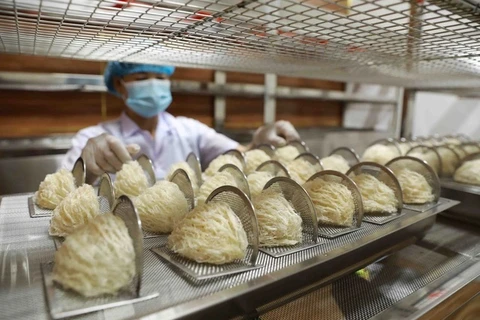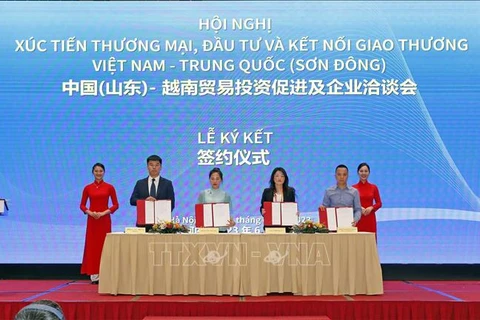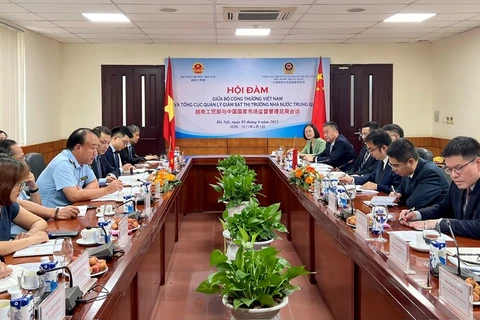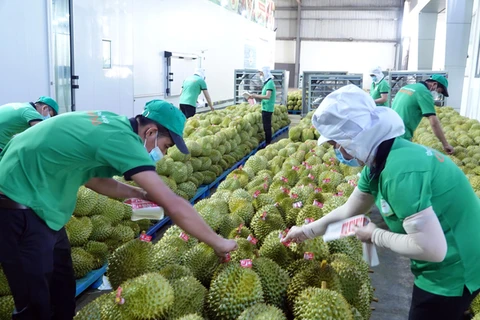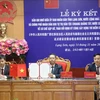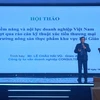Hanoi (VNA) – The Ministry of Agriculture and Rural Development (MARD) has sent a working group to China’s Guangxi and Yunnan provinces to seek measures to promote the trading of agro-forestry-fisheries products between Vietnam and China, one of the major export markets of Vietnam, said Deputy Minister Tran Thanh Nam.
According to Nam, the Chinese economy has shown strong recovery with GDP growth reaching 4.5% in the first quarter of this year. The neighbouring country has high demand for Vietnamese agro-forestry-fisheries products.
However, the border gates of both countries are often overloaded, especially during the harvest season of many agricultural products, leading to congestions at the gates, he said.
Meanwhile, high requirements of the Chinese market, along with strict customs clearance, have prevented many kinds of Vietnamese agricultural products from entering China, said Nam.
The official said that during the working group’s visit, the two sides organised many straightforward discussions to deal with the situation.
Nam said that 70% of Vietnamese agricultural products are exported to China through border gates in Guangxi and Yunnan.
The two Chinese localities agreed with the MARD on the need to connect the farm produce supply chain after COVID-19 pandemic is controlled. They will organise an annual meeting with Vietnam in November to review and evaluate their cooperation outcomes in a year and seek orientations for cooperation in the following year.
They also agreed with Vietnam’s proposal to form an association of agricultural businesses of Vietnam and Guangxi, and another of Vietnam and Yunnan, aiming to build sustainable agricultural supply chains.
The customs authorities of Guangxi and Yunnan also concurred to create favourable conditions for customs clearance activities through border gates, Nam said.
He also stressed the need for upgrading the infrastructure system in border gates to meet the import-export demands between the two countries.
The Kunming customs department has agreed to propose to the General Administration of Customs of China to expand the list of aquatic products eligible to be exported to Yunnan, said Nam.
The two sides also agreed to set up connecting points to coordinate in settling problems in trading of agro-forestry-fisheries products.
Nam said that the MARD working group’s visit was fruitful, with both sides agreeing to finalise procedures for the signing of a memorandum of understanding on agricultural cooperation between the MARD and the administrations of Guangxi and Yunnan in September on the occasion of the China-ASEAN Expo.
The MARD Deputy Minister also revealed that the Chinese side agreed to open additional border gates with Vietnam, which will be built towards smart border gates using digital technology. The MARD concurred to develop single-window customs services in the country’s border gates.
According to Nam, during the visit, two agricultural trade promotion forums were held in Guangxi and Yunnan, drawing more than 100 Chinese and 20 Vietnamese firms, during which many cooperation issues were discussed.
The official held that in order to further boost the import-export activities between Vietnam and China in general as well as Guangxi and Yunnan in particular, it is necessary to build a sustainable value chain between the two countries to maintain connectivity between the two sides./.
According to Nam, the Chinese economy has shown strong recovery with GDP growth reaching 4.5% in the first quarter of this year. The neighbouring country has high demand for Vietnamese agro-forestry-fisheries products.
However, the border gates of both countries are often overloaded, especially during the harvest season of many agricultural products, leading to congestions at the gates, he said.
Meanwhile, high requirements of the Chinese market, along with strict customs clearance, have prevented many kinds of Vietnamese agricultural products from entering China, said Nam.
The official said that during the working group’s visit, the two sides organised many straightforward discussions to deal with the situation.
Nam said that 70% of Vietnamese agricultural products are exported to China through border gates in Guangxi and Yunnan.
The two Chinese localities agreed with the MARD on the need to connect the farm produce supply chain after COVID-19 pandemic is controlled. They will organise an annual meeting with Vietnam in November to review and evaluate their cooperation outcomes in a year and seek orientations for cooperation in the following year.
They also agreed with Vietnam’s proposal to form an association of agricultural businesses of Vietnam and Guangxi, and another of Vietnam and Yunnan, aiming to build sustainable agricultural supply chains.
The customs authorities of Guangxi and Yunnan also concurred to create favourable conditions for customs clearance activities through border gates, Nam said.
He also stressed the need for upgrading the infrastructure system in border gates to meet the import-export demands between the two countries.
The Kunming customs department has agreed to propose to the General Administration of Customs of China to expand the list of aquatic products eligible to be exported to Yunnan, said Nam.
The two sides also agreed to set up connecting points to coordinate in settling problems in trading of agro-forestry-fisheries products.
Nam said that the MARD working group’s visit was fruitful, with both sides agreeing to finalise procedures for the signing of a memorandum of understanding on agricultural cooperation between the MARD and the administrations of Guangxi and Yunnan in September on the occasion of the China-ASEAN Expo.
The MARD Deputy Minister also revealed that the Chinese side agreed to open additional border gates with Vietnam, which will be built towards smart border gates using digital technology. The MARD concurred to develop single-window customs services in the country’s border gates.
According to Nam, during the visit, two agricultural trade promotion forums were held in Guangxi and Yunnan, drawing more than 100 Chinese and 20 Vietnamese firms, during which many cooperation issues were discussed.
The official held that in order to further boost the import-export activities between Vietnam and China in general as well as Guangxi and Yunnan in particular, it is necessary to build a sustainable value chain between the two countries to maintain connectivity between the two sides./.
VNA


